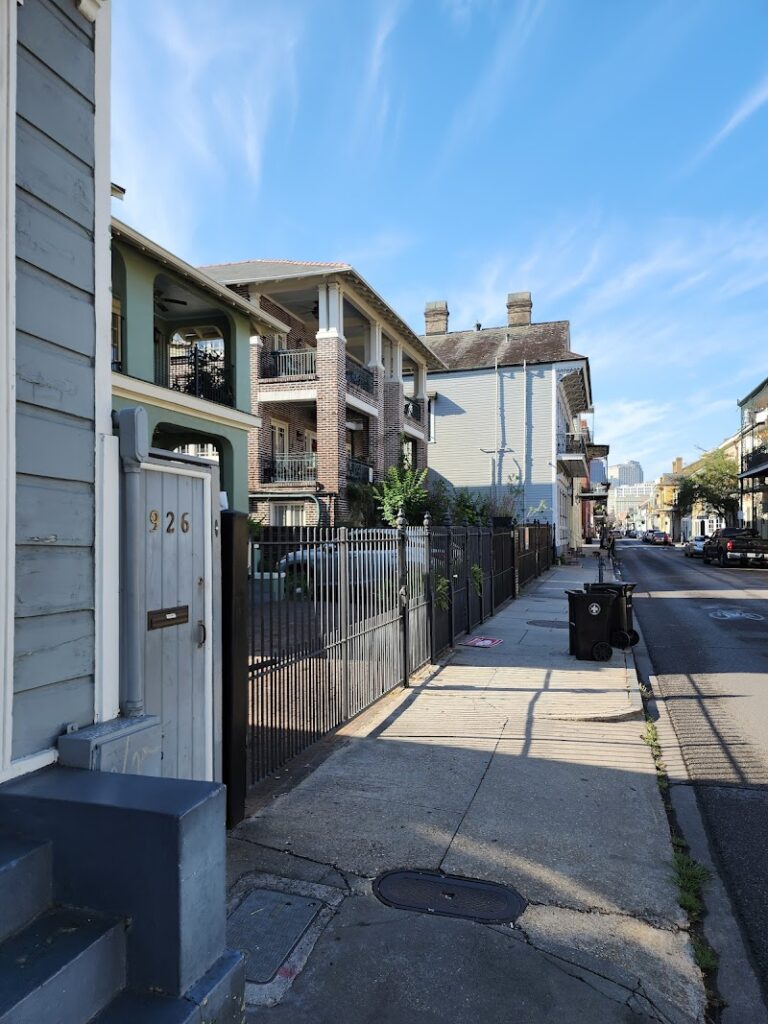Did you know that New Orleans, popularly known as the "most unique city in America," boasts more than 20 distinctive neighborhoods and over 130 festivals annually? With a range of offerings, from the vibrant parades of Mardi Gras in the French Quarter to the soulful tunes of Jazz in the Marigny,New Orleans provides a sensory overload of experiences as diverse and unique as the city's rich cultural tapestry.
As you set off on your expedition to this mesmerizing city, a detailed tourist map of United States, particularly focusing on New Orleans, would be your trusty companion. This invaluable tool will not only guide you through the city's complex streets but alsouncover hidden gems and iconic landmarks, helping you get the most out of your New Orleans adventure. Keep it by your side, and you'll never miss a beat of the city's pulsating heart.
Booking.comUnveiling the Charm of New Orleans: Must-See Attractions
Imagine a city where the energy of its people is as vibrant as its music, where the streets are overflowing with history, and where every corner reveals a unique story. Welcome to New Orleans, a city that dances to its own rhythm and invites you to join the celebration. To explore more celebrations in American cities, check out the festive side of New York City.
Discover the Magic of the Garden District
Stepping into the Garden District is like time-traveling to a bygone era. This historic neighborhood, with its well-preserved antebellum mansions and iconic cast-iron fences, embodies old-world elegance and southern charm. Stroll along Magazine Street, a shopping haven filled with boutique stores, galleries, and local eateries. This district, once a plantation, is a living testament to New Orleans' rich past. For a broader view of the historical side of the United States, a tourist map of St. Louis can be quite helpful.
Experience the Vibrancy of Bywater
Bywater, known for its vibrant Creole cottages and thriving arts scene, has a distinct charm setting it apart. Its streets decked with murals, its eclectic boutiques, and its lively music venues create an ambiance that's undeniably effervescent. One of the hidden gems in this neighborhood is the Music Box Village, an outdoor art installation where the houses themselves serve as musical instruments. This intriguing attraction perfectly aligns with the city's deep-rooted music culture.
Immerse Yourself in the Historic French Market
The French Market, extending six blocks along the Mississippi River, is more than just a market. It's a cultural hub, injecting life into the spirit of New Orleans with a sensory overload of sights, sounds, and flavors. From fresh produce stalls to artisan crafts, antique treasures to Creole delicacies, the French Market offers a glimpse into New Orleans' vibrant multicultural heritage. Just a stone's throw away, you'll find the renowned Café du Monde, famous for its delicious beignets, a classic New Orleans treat.
Explore the Mysteries of New Orleans' Cemeteries
The cemeteries of New Orleans, known as the "Cities of the Dead," are an intriguing sight. With their ornate tombs and above-ground vaults, these cemeteries narrate enthralling stories of the city's past. The most popular of these is St. Louis Cemetery No. 1, the final resting place of voodoo queen Marie Laveau. A visit to these cemeteries offers a unique perspective on the city's intricate history and cultural traditions. If this historical aspect intrigues you, you might also want to explore the historical side of Baton Rouge, another city rich in culture.
Relish the City's Culinary Delights
New Orleans is a city of culinary delights. The city's food echoes its culture, offering a gastronomic journey reflecting its multicultural roots and traditions. From Creole to Cajun, French to African, New Orleans' flavors are as vibrant and varied as the city itself. Treat yourself to a po'boy sandwich, savor the city's renowned gumbo, or indulge in a bowl of jambalaya for a truly authentic taste of New Orleans.

Practical Information for Visiting New Orleans
Transportation and Mobility
Traversing this vivacious city is quite easy. The city's robust public transportation system, including buses, streetcars, and ferries, offers affordable and efficient travel options. Daily bus passes are available at $3, while a 5-day pass costs $15. For an authentic New Orleans experience, hop onto one of the city's iconic streetcars, with lines operating across Canal Street, St. Charles Avenue, and along the Mississippi Riverfront. A single ride costs $1.25, and a one-day pass is $3.
Schedules and Prices
New Orleans is a city that never sleeps, with numerous restaurants, bars, and music venues staying open until late. However, it's essential to check specific hours of operations as some establishments may close earlier on weekdays. In terms of prices, you can expect to pay around $10-20 for a casual meal, while a dinner at a high-end restaurant can cost around $50 and above per person. Museum entry fees range from free to about $20.
Safety Tips
Like any major city, it's essential to stay aware of your surroundings in New Orleans. Avoid isolated areas at night, especially outside the central tourist districts. The city has made significant strides in improving safety in recent years, but it's always advisable to travel in groups whenever possible. Also, keep an eye on your belongings in crowded areas.
Practical Recommendations
The best time to enjoy New Orleans is during its cooler months from November to March. However, if you're aiming to experience the true soul of the city, consider visiting during Mardi Gras or the Jazz Fest. Just remember, these are busy times, so book accommodations and activities in advance. Also, bear in mind that summer can be pretty hot and humid, so pack accordingly if you plan to visit during this time.
Lastly, always carry some cash, as not all vendors accept credit cards. And don't forget your ID if you plan to enjoy the city's renowned nightlife, as some venues strictly enforce age restrictions.

Frequently Asked Questions about New Orleans
Even with all the information provided, you may still have unique queries about your New Orleans trip. Below, we address certain questions that might not have been covered in the previous sections.
1. Is New Orleans a kid-friendly destination?
Yes, New Orleans offers numerous attractions suitable for kids. From the Audubon Zoo and Aquarium to the Louisiana Children’s Museum situated in the heart of the city, there's an array of kid-friendly activities. However, while the city is full of life and culture, it's advisable to avoid Bourbon Street after dark with children due to the lively nightlife.
2. Are there any special considerations for travelers with disabilities?
New Orleans is increasingly accessible for travelers with disabilities. Many hotels, restaurants, and attractions have implemented measures to accommodate all visitors. However, some older areas, like the French Quarter, might pose challenges due to historic cobblestone streets and sidewalks. It's recommended to plan your itinerary in advance and contact the places you intend to visit for specific accessibility information.
3. Does New Orleans have a dress code I should be aware of?
While there is no official dress code, New Orleans' subtropical climate calls for lightweight, breathable clothing. For most of the year, you'd be comfortable in shorts, t-shirts, and comfortable walking shoes. However, some upscale restaurants and clubs may require more formal attire, so if you plan to dine or party in style, don't forget to pack accordingly!
4. Can I visit plantations around New Orleans?
Yes, there are several historic plantations around New Orleans that you can visit. Plantation tours provide a profound way to experience the region's complex history. Places like the Whitney Plantation and Laura Plantation offer insightful tours focusing on the lives of the enslaved individuals who worked there.
5. Do I need to worry about hurricanes when visiting New Orleans?
New Orleans, like much of the Gulf Coast, is susceptible to hurricanes, particularly between June and November. It's important to stay updated on the weather forecast during your trip. However, the city has robust systems in place for hurricane warnings and evacuations. Always follow any advice given by local authorities and your accommodation providers.
6. I'm a vegan/vegetarian. Will I find suitable food options in New Orleans?
Definitely! New Orleans' culinary scene is not all about seafood and meat dishes. The city has seen a rise in vegan and vegetarian eateries in recent years, offering everything from Creole-inspired dishes to international cuisine. Places like Seed in the Lower Garden District and Green Goddess in the French Quarter cater to plant-based diets.

